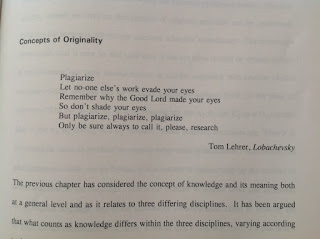I’ve posted before about a petition to government, askingfor legislation to ban essay mills. The petition is more than half-way towards
its first target – enough signatures to require a government response.
Let’s rehearse the issues.
There are organisations – known as essay mills – which for a
fee will write an essay or similar piece of work to whatever specification a student
asks. Although they market themselves as revision aids, there is no doubt that
they are aiming to encourage students to buy an essay which they can submit as
part of their university assessment, instead of writing it themselves.
This is a bad thing. The student doesn’t learn, and is cheating.
So for those of you keeping count, this is in fact two bad things. And it’s
hard to stop.
 |
| Half-way there ... |
It’s hard to stop because the bought essay may not show up as
such in plagiarism detection software used by universities. In fact, essay
mills typically guarantee that they will pass such software checks – why would
they make this guarantee this if they were only revision aids?
So why the petition? A law won’t make plagiarism software
any better. But it can make it possible to deal with the essay mills, not just
the students who use them. At the moment, if a university suspects that a student
has submitted an essay that they have bought, the only laws which could apply are
those governing fraud. But to use this would involve university staff giving
evidence against individual students, which is time consuming and unlikely to
happen. (It’s important that students trust their academic tutors. Anything which
reduces this trust is a bad thing. That’s one of the problems with Prevent, by
the way.)
It’s also using heavy tactics. In my career I’ve had to deal
with many hundreds of cases where students have cheated, and nearly always it was
a student who didn’t understand what that what they’re doing was wrong
(plagiarism is a difficult concept, and culturally dependent). I can count on
the fingers of one hand the number of times where a cheating student was
clearly being malevolent. So by all means punish students who cheat – and help them
understand that what they have done is wrong – but we must remember that often
they cheat through ignorance or desperation.
If there was a law banning the advertising of essay writing services,
and the sale of essays through such services, it would be possible to remove
the issue at source. Accounts by those who have used such services show that
they are clearly seeking to entice students. There are also stories of students
being blackmailed once they have used the essay writing service. And under the
current legal framework, universities are powerless to deal with the essay
mills themselves.
This is why we need a law. It isn’t enough to deal with
individual students who cheat: they need to learn; and the problem of catching
them is real. There isn’t an existing legal framework which will enable
universities and sector bodies to deal with the essay mills themselves. It’s
time for the government to lend a helping hand.
Here’s the link to the petition. Please sign it, please
share the petition. Help to #BanEssayMills


